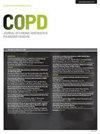Inhibitory Effect of P22077 on Airway Inflammation in Rats with COPD and Its Mechanism
IF 3.1
3区 医学
Q1 Medicine
International Journal of Chronic Obstructive Pulmonary Disease
Pub Date : 2024-03-20
DOI:10.2147/copd.s451244
引用次数: 0
Abstract
Purpose: Here, we studied the pharmacological effect of P22077 on airway inflammation induced by lipopolysaccharide and cigarette smoke and explored the therapeutic mechanism of P22077 in COPD model RAT.Patients and Methods: The COPD model was established by lipopolysaccharide combined with fumigation; animals were treated with vehicle or P22077. Serum, bronchoalveolar lavage fluid (BALF), and lung tissues were collected for analysis.
Results: Our results showed that P22077 treatment significantly improved the airway inflammation of COPD model RAT and reduced the recruitment of leukocytes in BALF, and hypersecretion of interleukin-18 (IL-18), interleukin-1β (IL-1β) in BALF and serum. H&E staining showed that P22077 treatment could effectively reduce emphysema, immune cell infiltration and airway wall destruction. PAS staining showed that The proliferation of cup cells in the airway wall and the number of bronchial cup cells were significantly reduced in rats treated with P22077. In addition, we found that P22077 treatment suppressed the generation of the NLRP3/ASC/Caspase 1 inflammasome complex to inhibit the inflammatory response caused by IL-1β and IL-18.
Conclusion: Conclusion: P22077 inhibits expression of NLRP3 pathway-related inflammatory factors and proteins and reduces the airway inflammatory response and inflammatory cell aggregation in COPD rats. The underlying mechanism may be related to the down-regulation of NLRP3 inflammatory vesicle signaling pathway expression.
Keywords: COPD, ubiquitinase inhibitors, P22077, airway inflammation, NLRP3
P22077 对慢性阻塞性肺病大鼠气道炎症的抑制作用及其机制
目的:研究P22077对脂多糖和香烟烟雾诱导的气道炎症的药理作用,并探讨P22077在慢性阻塞性肺疾病模型RAT中的治疗机制:通过脂多糖和熏蒸建立慢性阻塞性肺病模型,动物接受药物或P22077治疗。收集血清、支气管肺泡灌洗液(BALF)和肺组织进行分析:结果表明:P22077 能明显改善 COPD 模型 RAT 的气道炎症,减少 BALF 中白细胞的聚集,降低 BALF 和血清中白细胞介素-18(IL-18)、白细胞介素-1β(IL-1β)的分泌。H&E染色显示,P22077能有效减轻肺气肿、免疫细胞浸润和气道壁破坏。PAS 染色显示,P22077 治疗的大鼠气道壁杯状细胞的增殖和支气管杯状细胞的数量明显减少。此外,我们还发现 P22077 能抑制 NLRP3/ASC/Caspase 1 炎性体复合物的生成,从而抑制 IL-1β 和 IL-18 引起的炎症反应:结论P22077抑制了NLRP3通路相关炎症因子和蛋白的表达,降低了COPD大鼠的气道炎症反应和炎症细胞聚集。其潜在机制可能与下调 NLRP3 炎性囊泡信号通路表达有关:慢性阻塞性肺病 泛素酶抑制剂 P22077 气道炎症 NLRP3
本文章由计算机程序翻译,如有差异,请以英文原文为准。
求助全文
约1分钟内获得全文
求助全文
来源期刊

International Journal of Chronic Obstructive Pulmonary Disease
RESPIRATORY SYSTEM-
CiteScore
5.10
自引率
10.70%
发文量
372
审稿时长
16 weeks
期刊介绍:
An international, peer-reviewed journal of therapeutics and pharmacology focusing on concise rapid reporting of clinical studies and reviews in COPD. Special focus will be given to the pathophysiological processes underlying the disease, intervention programs, patient focused education, and self management protocols. This journal is directed at specialists and healthcare professionals
 求助内容:
求助内容: 应助结果提醒方式:
应助结果提醒方式:


